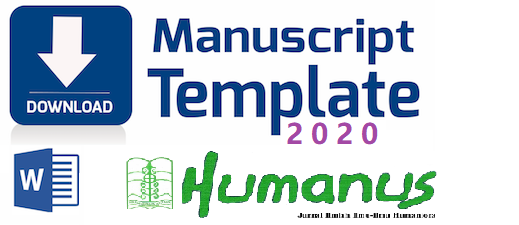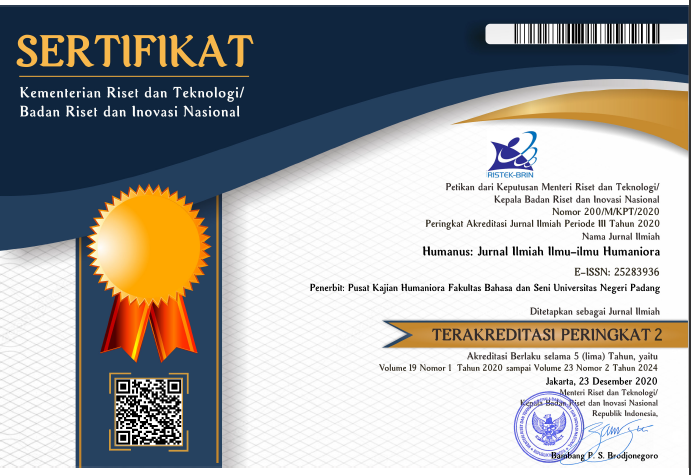Metaphorical Language Innovation in the Globalization Context
 ), Ferdinal Ferdinal(2), Desak Putu Eka Pratiwi(3), Ni Putu Cahyani Putri Utami(4),
), Ferdinal Ferdinal(2), Desak Putu Eka Pratiwi(3), Ni Putu Cahyani Putri Utami(4), (1) Universitas Andalas Padang, Indonesia
(2) Universitas Andalas Padang, Indonesia
(3) Universitas Mahasaraswati Denpasar, Indonesia
(4) Universitas Mahasaraswati Denpasar, Indonesia
 Corresponding Author
Corresponding Author
Copyright (c) 2024 Oktavianus Oktavianus, Ferdinal Ferdinal, Eka Pratiwi Desak Putu, Putri Utami Ni Putu Cahyani
DOI : https://doi.org/10.24036/humanus.v23i2.128863
Full Text:
 Language : en
Language : en
Abstract
Keywords
References
Akdemir, A. M. (2004). Küreselleşme ve Kültürel Kimlik Sorunu. Atatürk University Journal of Graduate School of Social Sciences, 3(1).
Bozkurt, V. (2000). Küreselleşmenin Insani Yüzü. İstanbul: Alfa Press.
Çayak, S &, Eskici, M. (2018). Globalization: In Terms of Teachers' Opinion and Metaphorical Perceptions. World Journal of Education, 8(3), 44-55. URL: https://doi.org/10.5430/wje.v8n3p44.
Croft, W & Cruse, D.A. (2005). Cognitive Linguistics. Cambridge: Cambridge University Press.
Farhan, F. B., Revita I, Oktavianus, O. (2024). Persuasive Languages on Political Billboard of the 2024 Indonesian General Election in Padang City West Sumatra, Indonesia. Cogent Arts and Humanities, 11(1). 1-20.
Ferdinal, F.., Oktavianus, O. ., & Zahid, I. . (2023). Exploring the Beauty of Islamic Values Through Metaphorical Expressions in Literary Work. Afkar: Jurnal Akidah &Amp; Pemikiran Islam, 25(2), 421–458.
https://doi.org/10.22452/afkar.vol25no2.13.
Hadi, A. (2024). “Menu Restoran Padang dengan Nama Partai Yang Lagi Trending”. https://www.hariankami.com/gaya-hidup-kami/23611955165/menu-restoran-padang-dengan-nama-partai-yang-lagi-trending. Retrieved, 16/05:2024. 21:45.
Karaman, K. (2010). Globalization and Education. Zeitschrift für die Welt der Türken/Journal of World of Turks, 2(3), 131-144
Kress, G. (2009). Multimodality: A Social Semiotic Approach to Contemporary Communication. London: Routledge. DOI: https://doi.org/10.4324/9780203970034
Lakoff, G. & Johnson, M. (1980). Metaphors We Live By. Chicago: The University of Chicago Press.
Lakoff, G. (1993). The Contemporary Theory of Metaphor in Metaphor and Thought, Ortony (Ed), 202–51. Cambridge: Cambridge University Press.
Lakoff, G. & Turner, M. (1989). More Than Cool Reason: A Field Guide to Poetic Metaphor. Chicago: University of Chicago.
Mahsun. (2005). Metode Penelitian Bahasa: Tahapan, Strategi, Metode dan Tekniknya. Jakarta: PT. Raja GrafindoPersada.
Newmark, P. (1988). A Textbook of Translation. Shanghai Foreign Language Education Press.
Oktavianus, O., Ferdinal, F & Zahid, I. (2024a). Metafora Leksikal dan Nilai Budaya dalam Novel Hamka Di Bawah Lindungan Ka’bah. Pertanika: Social Sciences and Humanities, 32 (S1): 111 – 137.
DOI: https://doi.org/10.47836/pjssh.32.S1.05.
Oktavianus, O., Handayani, M. (2024b). Metafora dalam Bahasa Politik. Dalam Buku Persembahan Purnabhakti Prof. Dr. Drs. I Nyoman Sedeng, M.Hum., oleh Prof. Dr. Drs. I Nengah Sudipa, M.A (Ed). Denpasar: Swasta Nulus.
Oktavianus. (2023). Lanskap Linguistik Metafora Bahasa Minangkabau dalam Dakwah Agama Islam. Prosiding Seminar Nasional Bahasa, Sastra dan Budaya. FIB-UNUD. https://ejournal1.unud.ac.id/index.php/snbsb/article/view/755/595
Oktavianus. (2022). Kiasan dalam Bahasa Minangkabau. Padang: Minangkabau Press.
Oktavianus. (2019). The Roles and Designs of Written English at Public Places in Indonesia. Proceeding of The 4th International Seminar on Linguistics (ISOL-4).
Ortony, A. (Ed.). (1993). Metaphor and Thought. (2nd ed.). Cambridge: Cambridge University Press.
Ricoeur, P. (1977). The Rules of Metaphor: Multidisciplinary Studies of the Creation of Meaning in Language. London: Routledge and Kegan Paul.
Safitri, R.N., Burhanuddin B., Saharudin S. (2023). Metafora Leksikal dalam Teks Berita pada Situs Goal.com. KODE: Jurnal Bahasa, 12(3):173-195. DOI:10.24114/kjb.v12i3.48278
Şahin, İ. F. (2011). Küreselleşme Avrupa Birliği ve Türkiye. Ankara: Pegem Press.
Subhani, J. (2007). Wisata al-Quran. Tafsir Ayat-Ayat Metafora. Jakarta: Penerbit Al-Huda.
Sudaryanto. (2018). Metode dan Aneka Teknik Analisis Data. Yogyakarta: SIDU Press, 2018.
Thomas, J.A. (1995). Meaning in Interaction: Introduction to Pragmatics (1st Edition). Routledge (Tylor and Francis).
Wahid, M.H.F. (2021). Retensi dan Inovasi Fonologis Protobahasa Austronesia (Pan) pada Bahasa Sumbawa (Bs). Jurnal Deskripsi Bahasa, 4(1), 44-52. DOI: https://doi.org/10.22146/db.v4i1.4112
Yule, G. (2000). Pragmatics. Oxford: Oxford University Press.
 Article Metrics
Article Metrics
 Abstract Views : 97 times
Abstract Views : 97 times
 PDF Downloaded : 20 times
PDF Downloaded : 20 times
Refbacks
- There are currently no refbacks.
Copyright (c) 2024 Oktavianus Oktavianus, Ferdinal Ferdinal, Eka Pratiwi Desak Putu, Putri Utami Ni Putu Cahyani

This work is licensed under a Creative Commons Attribution-NonCommercial 4.0 International License.










